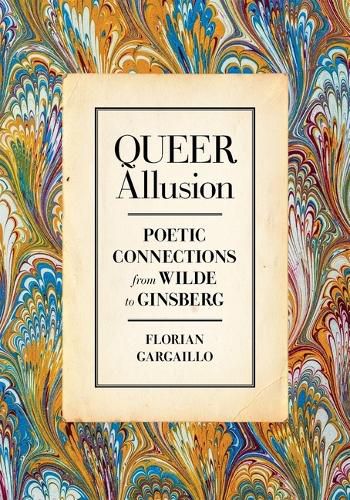Readings Newsletter
Become a Readings Member to make your shopping experience even easier.
Sign in or sign up for free!
You’re not far away from qualifying for FREE standard shipping within Australia
You’ve qualified for FREE standard shipping within Australia
The cart is loading…






Queer Allusion uncovers the crucial but underexamined role played by literary allusion in shaping queer poetry on both sides of the Atlantic, from the trial of Oscar Wilde in 1895 to the Stonewall Riots of 1969. In this wide-ranging, erudite study of influence and personal expression, Florian Gargaillo identifies three major functions of allusion for LGBTQ poets. First, allusion enabled writers to process their experiences through literary antecedents, and thus shape their identities in writing. Second, allusion provided a means to establish connections with other authors at a time when LGBTQ communities were often isolated and clandestine. Finally, establishing links across multiple works helped build a queer literary canon running parallel to the traditional contours of English-language verse.
Gargaillo shows that allusion's particular appeal for queer poets lay in its blend of secrecy and openness. LGBTQ poets employed allusion to understand themselves, connect with others, and establish an alternative, underground poetic tradition. Queer Allusion thus provides an innovative framework for studying LGBTQ poetry, tracing lineages from figures like Wilde to A. E. Housman and Countee Cullen, who are rarely considered together due to differences in style, period, or movement. Through incisive close readings and contextual analysis, this book offers a new map of LGBTQ literary history and a new way to view the relationship between queer poets and the poetic past.
$9.00 standard shipping within Australia
FREE standard shipping within Australia for orders over $100.00
Express & International shipping calculated at checkout
Queer Allusion uncovers the crucial but underexamined role played by literary allusion in shaping queer poetry on both sides of the Atlantic, from the trial of Oscar Wilde in 1895 to the Stonewall Riots of 1969. In this wide-ranging, erudite study of influence and personal expression, Florian Gargaillo identifies three major functions of allusion for LGBTQ poets. First, allusion enabled writers to process their experiences through literary antecedents, and thus shape their identities in writing. Second, allusion provided a means to establish connections with other authors at a time when LGBTQ communities were often isolated and clandestine. Finally, establishing links across multiple works helped build a queer literary canon running parallel to the traditional contours of English-language verse.
Gargaillo shows that allusion's particular appeal for queer poets lay in its blend of secrecy and openness. LGBTQ poets employed allusion to understand themselves, connect with others, and establish an alternative, underground poetic tradition. Queer Allusion thus provides an innovative framework for studying LGBTQ poetry, tracing lineages from figures like Wilde to A. E. Housman and Countee Cullen, who are rarely considered together due to differences in style, period, or movement. Through incisive close readings and contextual analysis, this book offers a new map of LGBTQ literary history and a new way to view the relationship between queer poets and the poetic past.